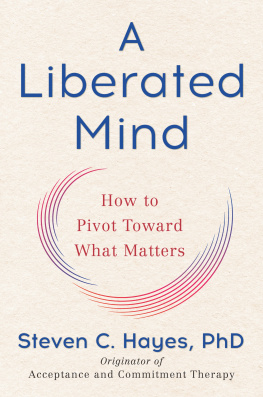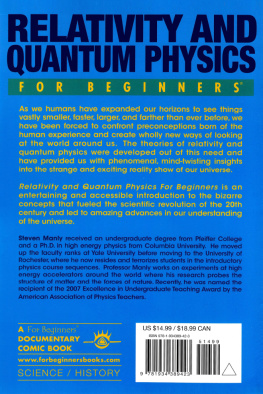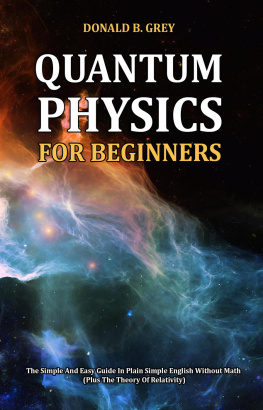Hayes - Quantum Physics for Beginners: The Easy Guide to Understand how Everything Works through the Behavior of Matter, the Law of Attraction and the Theory of Relativity
Here you can read online Hayes - Quantum Physics for Beginners: The Easy Guide to Understand how Everything Works through the Behavior of Matter, the Law of Attraction and the Theory of Relativity full text of the book (entire story) in english for free. Download pdf and epub, get meaning, cover and reviews about this ebook. year: 2020, genre: Romance novel. Description of the work, (preface) as well as reviews are available. Best literature library LitArk.com created for fans of good reading and offers a wide selection of genres:
Romance novel
Science fiction
Adventure
Detective
Science
History
Home and family
Prose
Art
Politics
Computer
Non-fiction
Religion
Business
Children
Humor
Choose a favorite category and find really read worthwhile books. Enjoy immersion in the world of imagination, feel the emotions of the characters or learn something new for yourself, make an fascinating discovery.

- Book:Quantum Physics for Beginners: The Easy Guide to Understand how Everything Works through the Behavior of Matter, the Law of Attraction and the Theory of Relativity
- Author:
- Genre:
- Year:2020
- Rating:5 / 5
- Favourites:Add to favourites
- Your mark:
- 100
- 1
- 2
- 3
- 4
- 5
Quantum Physics for Beginners: The Easy Guide to Understand how Everything Works through the Behavior of Matter, the Law of Attraction and the Theory of Relativity: summary, description and annotation
We offer to read an annotation, description, summary or preface (depends on what the author of the book "Quantum Physics for Beginners: The Easy Guide to Understand how Everything Works through the Behavior of Matter, the Law of Attraction and the Theory of Relativity" wrote himself). If you haven't found the necessary information about the book — write in the comments, we will try to find it.
Hayes: author's other books
Who wrote Quantum Physics for Beginners: The Easy Guide to Understand how Everything Works through the Behavior of Matter, the Law of Attraction and the Theory of Relativity? Find out the surname, the name of the author of the book and a list of all author's works by series.
Quantum Physics for Beginners: The Easy Guide to Understand how Everything Works through the Behavior of Matter, the Law of Attraction and the Theory of Relativity — read online for free the complete book (whole text) full work
Below is the text of the book, divided by pages. System saving the place of the last page read, allows you to conveniently read the book "Quantum Physics for Beginners: The Easy Guide to Understand how Everything Works through the Behavior of Matter, the Law of Attraction and the Theory of Relativity" online for free, without having to search again every time where you left off. Put a bookmark, and you can go to the page where you finished reading at any time.
Font size:
Interval:
Bookmark:

Quantum physics confirms that a thing can only exist if it is observed. The quantum is organized according to the principles that influence the observer's mind. In this context, its important to define quantum in general terms. It is a whole set of knowledge that considers the smallest particles in nature. Their behavior and condition allow them to interact with each other, resulting in one of the fundamental concepts: quantization. It is generally understood as the departure from a set of concrete values to attain discrete ones. Quantum is more accurately and concisely detailed by the end of the first chapter.
When something is observed, quantum merges into subatomic particles. Then into atoms, followed by molecules. Until finally, something in the physical world manifests itself as a localized temporal spacetime experience that can be perceived through the mediation of our five physical senses. It would then lead to something that appears to be reliable and is part of what people usually understand as physical reality. As energy, every single thought directly and instantly influences the quantum field, whereby Quantum merges into a localized, observable experience event, object, or other influence.
This process is the basis for how everyone creates their reality. Those who understand and comply with universal laws are conscious creators, while others create their life experience by default. As a result, they attribute everything experienced as a consequence of their unconscious thinking to superstitious beliefs such as luck, fate, chance, and fortune. We know that conscious creation is also the basis of the law of attraction and the law of cause and effect. We will talk more about this in Chapter 15
Quantum Physics is more about explaining the microscopic world with equations to match observations, then observations matching equations. As someone who finds this microscopic world and all the parts of it fascinating, it quickly becomes apparent that your math skills need to be sharpened to understand this area of study. Not only that, the discoveries made at the turn of the 20 th century that kicked off the study of quantum physics have had enormous repercussions on philosophy, our way to interpret reality, but even literature, music, and last but not least, sci-fi, comics, and movies.
Whether you are looking for a general overview of the subject or an introduction to one of the most fascinating subjects the human mind has ever thought of, this book is the perfect choice for you. I want to share with you all the amazing discoveries of quantum physics and their philosophical and technological applications and, I promise you, you wont be disappointed. When you put down this book, you wont only have a basic but precise knowledge of quantum physics, and youll find yourself looking at the world with new eyes.
While it is true that for a complete and profound knowledge of quantum physics, a study of mathematics is necessary, you can gaze and marvel at the wonders of the universe, even with a basic or non-existent knowledge of mathematics. Actually, the most interesting concept of quantum physics is philosophical, and to understand them, you will only need your curiosity and thirst for knowledge.
This book aims to make quantum physics a fun and rewarding experience for anybody. It is also meant as an introduction to the most compelling physics dilemmas of our times. Hopefully, it will shed some light and give you some insight into this fascinating subject that has been treated as a matter for geniuses and math wizards for too long.
Quantum physics is a realm that seems unreachable and beyond understanding to many people, but its actually an extremely fascinating branch of science. A lot of quantum physics is still largely undiscovered or unexplained, and thats what makes it so charming!
Throughout this book, well explore quantum experiments and theories, both how they came to be and then how they have grown to become critical parts of what we now know as quantum physics.
This book will give a concise and clear exposition of quantum physics. Keep an open mind, and you will find a whole new world. Lets dive in and uncover the basics of quantum physics!
We take atoms for granted. Their existence was still controversial until the beginning of the 20th century. Already in the 5th century BC, the ancient Greeks, especially Leukipp and his pupil Democritus, spoke of atoms. They thought the matter was made up of tiny, indivisible units. They called these atoms (ancient Greek "tomos" = indivisible).
It wasnt until the end of the 18th century that science provided concrete evidence of atoms' existence. In 1789 Antoine Lavoisier formulated the law of conservation of mass. 10 years later Joseph Louis Proust formulated the law of definite proportion, until John Dalton built upon these theories to develop the law of multiple proportions. His publication in 1805 marked the beginning of the scientific atomic theory.
Font size:
Interval:
Bookmark:
Similar books «Quantum Physics for Beginners: The Easy Guide to Understand how Everything Works through the Behavior of Matter, the Law of Attraction and the Theory of Relativity»
Look at similar books to Quantum Physics for Beginners: The Easy Guide to Understand how Everything Works through the Behavior of Matter, the Law of Attraction and the Theory of Relativity. We have selected literature similar in name and meaning in the hope of providing readers with more options to find new, interesting, not yet read works.
Discussion, reviews of the book Quantum Physics for Beginners: The Easy Guide to Understand how Everything Works through the Behavior of Matter, the Law of Attraction and the Theory of Relativity and just readers' own opinions. Leave your comments, write what you think about the work, its meaning or the main characters. Specify what exactly you liked and what you didn't like, and why you think so.









